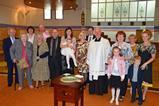Story is all around us. Whether it’s a film or video game, a book or TV show, we can’t escape the impact of story on our lives. Even the most banal of gameshows will tease out a contestant’s story and what they might do with the prize money to make us care and keep watching. Alex Taylor sits back and dives into the world of storytelling and how it can be a key part of faith development.

According to the film critic Roger Ebert, “the movies are like a machine that generates empathy”. The same is true of any kind of storytelling. It has the power to draw you in, to help you sympathise with some characters, while disliking others. You are immersed in the events of the plot, the feelings and motivations of the protagonist and antagonist, the setting of the story (whether a real or imaginary place).
And this empathy is generated not only for people who are like you, but also for people who are completely different. Where else would we get to inhabit the lives of people from different countries, different backgrounds and different experiences from us? In January alone, at the cinema, I was taken into the lives of the mother of lynched teenager in 1950s America (Till), a suicidal misanthrope (A Man Called Otto), Empress Elizabeth of Austria (Corsage), a silent-movie actress and a film producer (Babylon) and the conductor of a Berlin orchestra (Tár). Not all of these films were good (I’m looking at you, Babylon), but they all made me think, they all introduced me to new life experiences and they all inspired moments of real empathy.
Watching films and playing video games are all both great sources of story. However, I’m a book person and there’s one thing that books have over films or games – you don’t need any special equipment and you don’t need to be in a specific place to access the story inside.
You just need the book. You can read anywhere! And books are cheap – you don’t need to buy new ones, just borrow one off a friend, go to a charity shop or join a library. Not only this, but reading a novel can help you in different areas of life.

Reading is essential for life
Reading is key to flourishing in life. Our world works on using written words to communicate – WhatsApp, email, social media, websites all rely on the people using them being able to read. Our education system relies on reading and writing as a major tool for learning. And to get a job, even one that doesn’t rely too heavily on written communication, you still have to read the advert, fill in the application and sell yourself through words.
Anyone with low levels of literacy has a real struggle to access education and employment, if these low levels remain into adulthood. I’m not saying this is right, but it is how the world works at the moment.

Reading is good for your brain
You can learn stuff from books! You can fill your head with how to do things and then go out and try them. Now, of course you can watch videos to learn how do things – I fixed my toilet by googling the problem and watching someone teach me how to solve it on YouTube. However, I’m not going to become a competent plumber by just watching short videos. I’m going to have to study properly. The same is true of lots of areas in life – you can get so far with snippets, but to learn something fully, you’re going to have to read and practise.
Not only can you fill your brain through reading, the very act of reading is good for your brain. Various studies (including this one) have tried to discover the impact of reading stories on the brain. These studies found that reading stimulates the circuits and signals in the brain, and this increased brain activity can last for days! Just like our muscles, our brain has a ‘use it or lose it’ policy – just try to order a coffee in Barcelona with your GCSE Spanish when you’ve not used it for 30 years.
Research suggests that activities such as a reading and complex games like chess or sudoku might help brains resist conditions such as dementia for longer. The more we stimulate our brains, the more resilient they can become.
And in addition to this, reading can also improve your memory and improve your focus (a 2015 study by Microsoft found that people’s attention span online was eight seconds). Reading a novel requires your full attention for longer than you would normally give to an online article, so you develop the skill of immersing yourself in something for a substantial amount of time.
Reading is good for your mental health
According to the National Literacy Trust’s report, Mental well-being, reading and writing, those who are most engaged with reading score better on the Mental Well-being Index than those who are least engaged. There may be some correlation as well as causation here, but there are other reasons at play too.
Simply, there is the sheer joy of entering into a story. Entertainment such as reading a book takes you out of your own life and transports you somewhere different. We experience different lives, different landscapes, different events and feelings. Even sad stories or horror can make us feel better, and not because we’re consoled that there is always someone worse off than us. No, rather we come back to the idea of empathy.

Reading as a faith development tool
Reading stories allows us to experience the lives of people who aren’t like us, to go through the things that they go through, to see events through their eyes and to begin to understand their way of thinking. Doing this generates empathy and allows us to:
- Recognise that not everyone shares the same opinions as us, and those opinions are formed by life circumstances and experience.
- Understand more about those opinions and viewpoints, because we have walked in their shoes for a period of time.
- Consider how we would act in the same situation: would we do what the characters did? Or something different?
- See how our faith might be challenged and exercised in different situations.
And it’s this last point that I’d like to develop further. Reading stories about children and young people and faith can be a wonderful way for our own children and young people, and those with whom we work, to grow in their relationship with Jesus.
Now, it’s fair to say that Christian fiction can be a patchy affair. There have been some blockbuster series (about which I found this article interesting), but children’s and young people fiction has floundered a little.
In a previous life, I commissioned children’s and young people’s fiction for a Christian publisher. Many people thought that it was easy to write a Christian children’s story, but they were wrong. Novels that were submitted to me often fell into this pattern:
- We meet a child. They live in a stereotypical Christian family.
- Something happens to the child. This might be anything from losing a favourite toy to being bullied at school.
- The child tells a parent. They pray together. Whatever has happened is resolved.
- They live happily ever after.
There are a few problems with this. One, it’s unrealistic, and so gives the reader an unrealistic picture about what faith is like. Two, it makes grown-ups seem like they know everything and their faith is all sorted, leaving the reader feeling inadequate and that their faith will never be good enough. Three, characters are crudely drawn and don’t have any depth, leading to a fourth problem: it’s very boring.
Instead of building faith, stories like these can end up doing the opposite – they can put children and young people off, because the picture of being in relationship with Jesus depicted in the book bears no relation to their own experience. They can compare their own messy lives with the depiction of faith in stories and think that because theirs doesn’t match the ones they read about, they aren’t doing faith right or being a good Christian. So what makes a good faith story?
Well, the best children’s and young people’s Christian fiction books are as complex and well written as their secular counterparts. They show children and young people with realistic lives. They show Christian adults as flawed, but striving to live their lives and parent their children according to their friendship with Jesus. They show that sometimes things aren’t tied up in a neat bow by the end of the story, and that this is OK.
And the best Christian books allow children and young people to do the things I listed above: to see life through another’s eyes, to experience different life events, to understand the feelings of others and to think about what they themselves might do in different situations. And to reflect on how their faith might impact what they would do.
The best children’s and youth work is based on self-discovery: revelations are much more powerful when the child or young person discovers them for themselves rather than when they are told ‘the answer’ by a children’s or youth worker. The same is true of this kind of faith development. The best Christian fiction leaves the reader with questions that they themselves can try to answer and situations that they are compelled to wrestle with.
As parents, carers and children’s or youth workers, this can leave us feeling uncomfortable. We want to protect those in our care and not expose them to situations or feelings that might make them sad (or give them ideas!). We want to make sure we tell our children what they should do. But this does our children and young people a disservice.
When I was commissioning fiction books, I wanted to do something that helped young people think through the idea of being a Sunday Christian: when you go to church and are ‘good’ on a Sunday, but for the rest of the week, you turn your back on God and act in whatever way you want. It seemed to be an issue that many youth workers and parents were struggling with, so I commissioned one of my best fiction writers to come up with a story to explore this – a kind of church-based Mean Girls.
What came back was No Angel. It was a story of rebellion: of shoplifting, bullying and being two-faced. And, instead of these things happening to our Christian main characters, they were being done by our Christian main characters. The reader was able to see the implications of these actions; the repercussions had different effects on the different main characters.
Instead of being tied up neatly with ‘the answer’, the reader was confronted with characters they were familiar with (perhaps even characters that reflected who they themselves were). They could reflect on what they would have done and whether they too need to life out their faith more consistently.

Finding the right book
It can be tricky to find good Christian fiction books for children and young people, so where do you start? Well, in the same way that you might choose your own reading, get recommendations – from Christian parents or children’s and youth workers. They may have stories that their children and young people have enjoyed and been challenged by.
Search online for Christian fiction. (Or if you have one of those rarities, a Christian bookshop near you, browse their shelves.) While Christian publishing for children and young people has declined drastically in recent years, there are still organisations producing books (for example, SPCK, Dernier Publishing, The Good Book Company). And to make sure you’re getting a good book, read it yourself before you pass it on to your child or young person. Assess the book on some of the criteria discussed in this article – does it challenge, is the way the characters act realistic, does it allow for deeper reflection?
And be careful not to fall into that trap of trying to shield your child from difficult subjects. Fiction is a great way for children to safely explore those difficult subjects, so when they encounter them in real life, they have already thought about what they would do.
From my time commissioning fiction, I can recommend the classic author Patricia St John, as well as the more contemporary Hannah MacFarlane and Kathy Lee. And, of course, CS Lewis! However, there are plenty of others out there who will fit the bill for you.
Reading with your child
Reading can be a great solo experience, but when we’re trying to build faith as well as get all those other great benefits of reading, reading with your child can also bring worthwhile rewards. For a start, it means that children can explore books that are slightly older than they are able to read.
Now, you may have gone through this article getting frustrated because your child or children are not strong readers and don’t enjoy books. Those who struggle with reading often find that the books they are able to read are too young for them. Yet, if you read to your child, they can explore stories that are age appropriate.
And if you read to your child with a view to growing faith, you’re right there to chat about the story – you can wonder together what a character might do next, what your child might do in a similar situation, whether a choice made by a character was the right one or where Jesus might be in a story.
There are so many directions you can go in which will help children see what faith in action might look like. Even if your child reads for themselves, you can still ask them all these questions – particularly if you have already read the book to check it out.
–––
So, not only is reading good for us, we can explore stories that grow, refine and sharpen our faith. The same is true for adults, young people and children, so why not make use of this great faith development tool and introduce children to new ways to meet Jesus and discover what he has done for us?











































